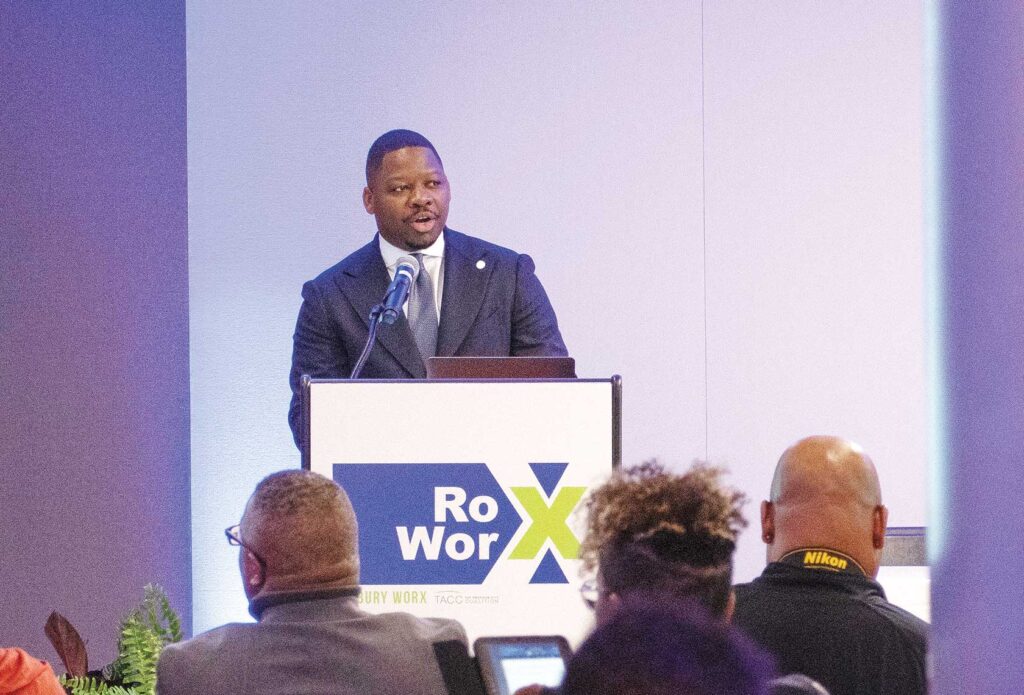
The need for increased coordination and cooperation was central to the assessment of industry and education representatives gathered at Roxbury Community College to discuss how to help Boston residents of color better access jobs in science, technology, engineering and mathematics at the second annual Roxbury Worx conference.
The Nov. 14 conference was part of a broader effort by The American City Coalition (TACC) designed to support middle-skill or hidden workers find employment opportunities, particularly in biotechnology, health care and environmental technology, or what TACC calls blue and green technology. Those workers are unemployed or underemployed and are seeking or open to jobs, but struggle to be noticed by employers due to existing hiring practices.
The effort is focused on residents in Roxbury, Dorchester and Mattapan — what TACC calls the “Roxbury Worx Zone.”
“We can connect new and vacant positions with talent that we know exists. There are people in this neighborhood who are looking for work, they just need opportunity,” said Rev. Willie Bodrick II, TACC’s president and CEO, in his welcome remarks.

Massachusetts Secretary of Labor and Workforce Development Lauren Jones (right) speaks during a conversation with Boston Chief of Worker Empowerment Trinh Nguyen (left) during the Roxbury Worx conference Nov. 14. BANNER PHOTO
Speakers at the conference said increased collaboration — between city and state governments, between programs that train residents for jobs in STEM fields, and between employers and employees — is necessary to change how Boston residents of color access employment.
When it comes to training programs working together, Brian Souza, vice president of operations and workforce development at MassBioEd, said it’s important for each program to understand what they offer in comparison to others.
“I think the key to functioning as a whole, in some ways, starts with awareness and being aware of one another’s programs and what the strengths and differentiators are for each of our programs,” Souza said, during a panel discussion on workforce development programs.
He pointed to the MassBioEd Life Science Career Hub as an example, which launched in October and works to connect job seekers with information about training programs and workforce preparation.
During a conversation between Lauren Jones, the state secretary of labor and workforce development, and Trinh Nguyen, Boston chief of worker empowerment, Jones said cooperation between their departments at levels of government is helped by the fact that the two share goals and ideals.
“I think we also share the same values in making sure that we’re able to lift up more people, individuals that live right here in our communities, disconnected individuals that have yet to jump into our labor market to tackle some of these hard challenges [like] how to reduce barriers, how to create more pathways to meaningful employment,” Jones said.
David Shapiro, president and CEO of the YMCA of Greater Boston, said it’s also about coordinating within an organization to make sure participants are getting the most out of a program. In reference to the wide range of offerings the YMCA has, he said that they do not always “connecting the dots.”
“Economics is never a barrier at the Y, so if you apply for a free membership, we don’t then say would you like help with workforce development? Or what other help could we provide? We got other services that might be helpful to you,” Shapiro said, during a panel discussion on youth workforce development. “There’s not sort of a connective tissue.”
Underlying the conference’s conversations was a discussion about how broader structural issues in society keep many Black and brown residents in Boston from achieving success in STEM jobs.
“There’s a whole system that’s not working for a whole lot of people,” said Amy Nishmam, senior vice president of strategy at JVS Boston. “I can run the best workforce development program ever, and if there isn’t affordable housing, transportation that works, accessible childcare that people feel safe leaving their kids there, none of this can work.”
Karilyn Crockett, an assistant professor of urban history, public policy and planning at MIT, said during a research presentation that change won’t come just from a single opportunity.
“It cannot just be about getting a good job. It cannot just be about an opportunity, but it has to be about generational wealth,” Crockett said. “That’s absolutely what’s at stake and what’s important.”
In an interview following the conference, Bodrick, from TACC, said the event gave Roxbury Worx a sense of what’s next.
“We started the conversation and began to work with one another to actually talk about where are we strong and where can we be stronger,” Bodrick said. “We know what our goals are, where we’re trying to go as an organization and as a community. So, I do think it gave us the marching orders.”
Moving forward, he said the initiative will continue work to create a digital tool to map resources in the community and help connect them to residents. He also said he would like to engage more closely science industries whose representatives one stakeholder said were lacking in attendance.
“[We need to] do that work in engaging our industry partners and bringing them into a convening space with more intimacy and intentionality so that all parts of the ecosystem are having conversation with one another, and we’re actually doing the alignment work that’s necessary,” Bodrick said.
Speakers encouraged attendees to take action after the conference.
“Whatever you’ve taken from this discussion today, act on,” said William Watkins, vice president of digital strategy and partnerships at the Urban League of Eastern Massachusetts. “Don’t let it just be a conversation, act on it.”






